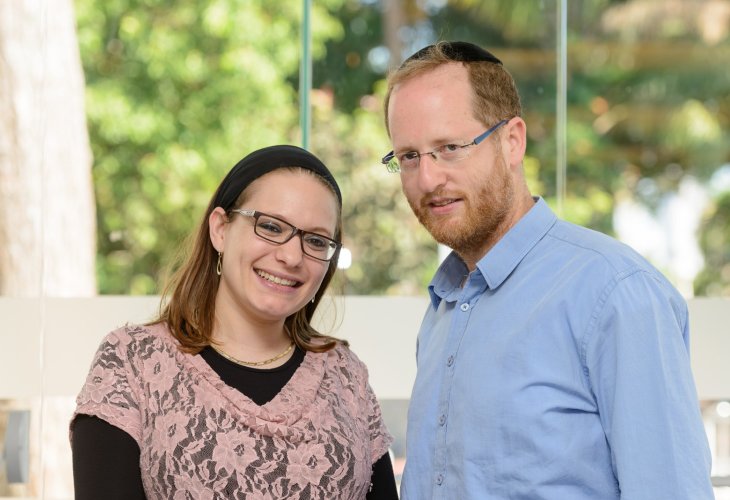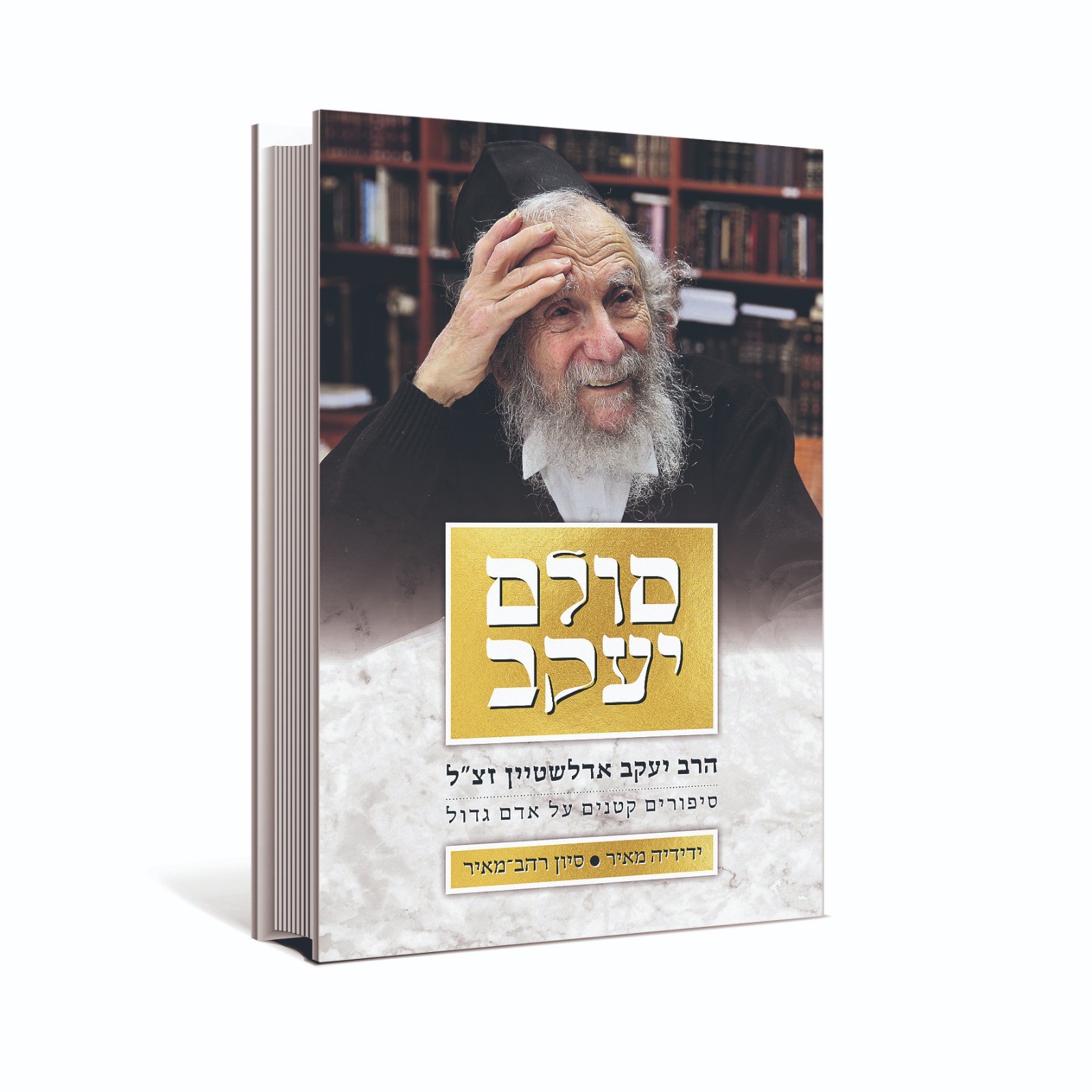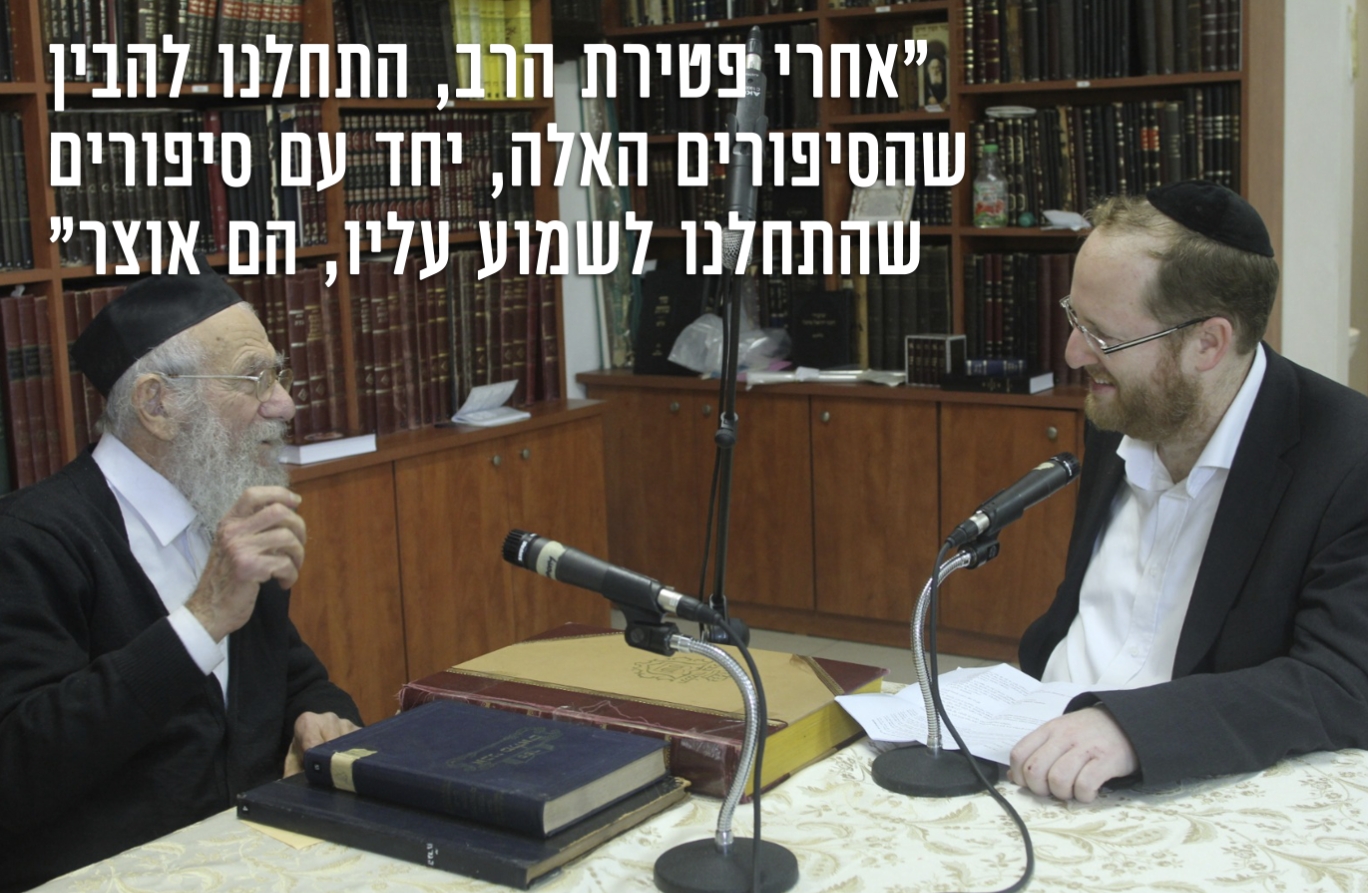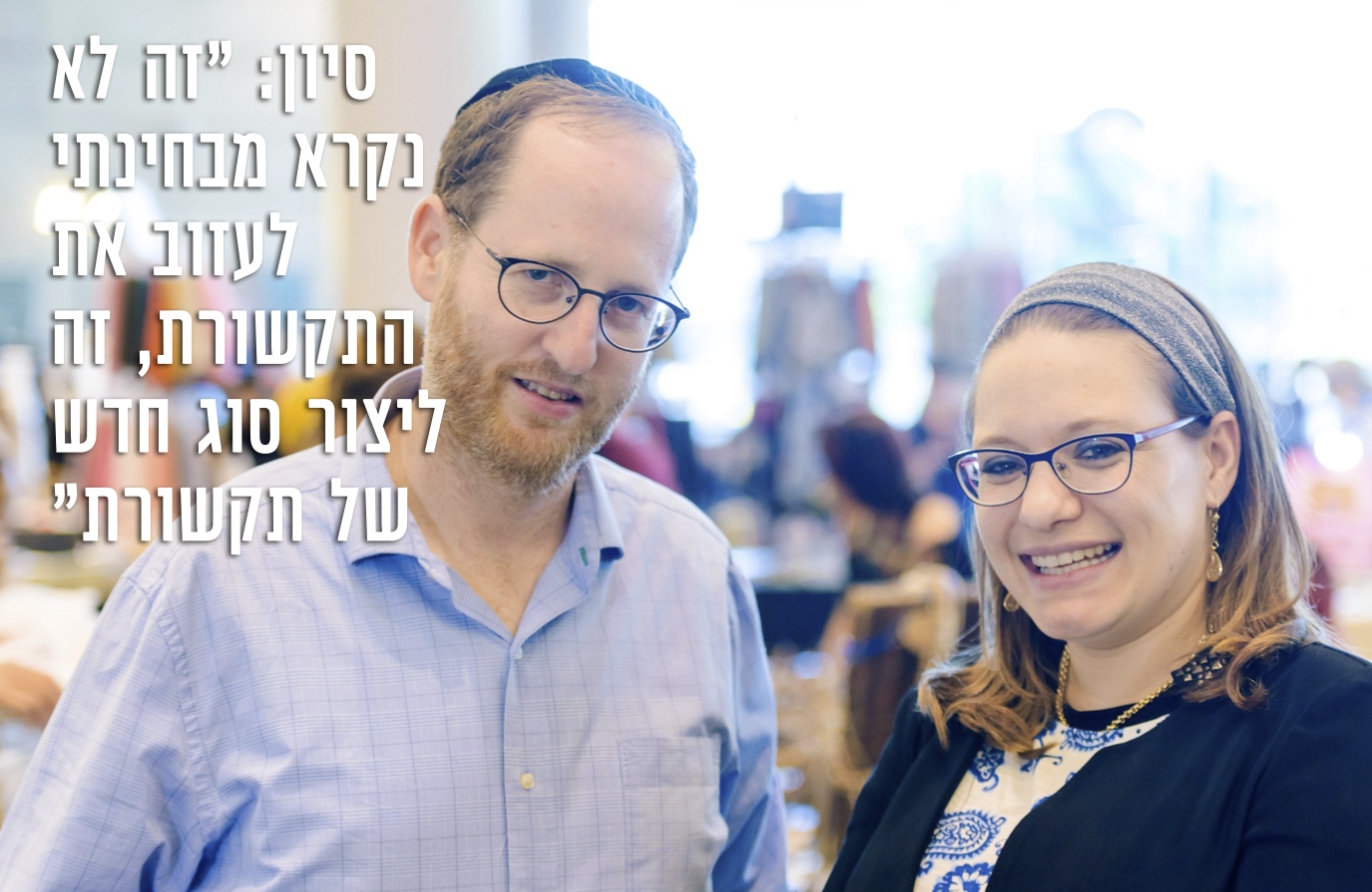Sivan Rahav-Meir and Yedidia Meir: "Surprised That Stories of Righteous People Are So Fashionable"
Do you know the project with no financial gain or ratings, yet you pursue it for the soul? That's the story behind "The Ladder of Jacob," the new book by Yedidia and Sivan Rahav-Meir about Rabbi Yaakov Edelstein ztz"l. So how did it manage to reach number 1 in the sales charts despite everything, why aren't there miracle stories, and which question particularly moved Sivan? A couple's interview with the duo trying to create a new type of communication.
 Yedidia and Sivan Meir (Photo: David Stein, 'With a Good Eye')
Yedidia and Sivan Meir (Photo: David Stein, 'With a Good Eye')In recent days, the book "The Ladder of Jacob" reached the top of the bestseller list of the "Steimatzky" chain and simultaneously the top of the weekly sales chart of the ultra-Orthodox "Mishpacha" magazine. The authors, the married couple Yedidia Meir and Sivan Rahav-Meir, were particularly moved to receive these figures.
It's hard to miss the fact that the book is their new baby. They give interviews about it, talk about it, and promote it on social media. It mainly creates (at least for me) an appreciation for the amount of energy that can be invested in a project close to their hearts, despite the fact it's not the most financially beneficial or media-oriented.
"The Ladder of Jacob" is essentially the result of a journey undertaken by Yedidia and Sivan Rahav-Meir, following the simple yet exalted figure of Rabbi Yaakov Edelstein ztz"l – who was the chief rabbi of Ramat Hasharon for nearly 70 years. Both met with the rabbi for many discussions, and even after his passing, they collected hundreds of short stories full of insights and meaning that genuinely create substantial effects on the reader. It's hard to remain indifferent to them.
 The book 'The Ladder of Jacob'
The book 'The Ladder of Jacob'"We wanted to write a book where ultra-Orthodox, religious, traditional, and secular people would feel at home in," says Sivan. "We hoped no one would feel it wasn't for them. The work wasn't easy, but it's heartwarming to see it succeeded, with Hashem’s help, as people from all sectors are connecting and reading and enjoying. We see this also in the responses – important rabbis on one hand, and people like Natan Goshen, Korin Gideon, Michal Ansky, and Hanan Ben-Ari wrote to us about how much the book touched them."
There have been many great rabbis in Israel with remarkable stories behind them. What made you dedicate an entire book to Rabbi Yaakov Edelstein specifically?
Yedidia: "There are many figures to learn from, and we personally knew the rabbi when we lived in Ramat Hasharon, for six years. We had the privilege to see a great man, a tzadik, up close. To see him on Shabbat and on weekdays, how he related to both the big and small people, how he conducted a lesson, but also how he interacted with people at the end of a lesson. During his lifetime, we were fortunate to sit with him for several significant conversations and document his life story. We sat in his living room, surrounded by grandchildren, and heard about his childhood, youth, the old world of yeshivas... It was fascinating. After his passing, we began to realize that these stories, along with stories we began to hear about him, are treasures. We started collecting more and more stories, and about two years after his passing – the book was ready."
 Yedidia Meir and Rabbi Edelstein ztz
Yedidia Meir and Rabbi Edelstein ztzSivan: "There's also something in his character that allows everyone to feel that they too can advance and improve. About a hundred people from various backgrounds are interviewed in the book, each telling a story we can learn from, something applicable to our lives. His character was, on one hand, very deep and high and uplifting, but on the other, he was friendly, popular, cordial, and caring. Just as during his life, the broadest audiences connected with him, we wanted the widest audience to connect with him through the book."
When was the moment you understood that it's not just about collecting stories, but really publishing them as a book?
Yedidia: "It took us time to realize it's worth moving forward. I remember during the shiva for the rabbi, I heard some wonderful stories and decided to come back again the next day to collect more. I sat there almost a whole week, with a laptop on my lap, listening, getting emotional, and documenting. But truly, it was the rabbi's grandson, Reuven Visky, who decided for us that a book needed to be made from all these stories. The dear Edelstein family was also on board, and we had the privilege to hear from them countless stories and memories. Simultaneously, the publishing house 'Yediot Books' was enthusiastic and decided to publish the book. It's a great joy to discover that this format of stories of the righteous has not gone out of style. People still want to hear such stories, maybe in a slightly newer and updated version, but still stories of the righteous. We called the book: 'Small Stories About a Great Man'. Indeed, we are surprised that stories of righteous people are so fashionable."
How was the experience of writing and editing together? Who was dominant? How was the work divided?
Yedidia: "Sivan's role was to write. I was responsible for the stories that didn’t make it... Seriously: the material was endless. The researcher Yisrael Meir met people, and we too had many meetings and phone conversations. At some point, when the word spread – people started sending us emails with stories. There are also many wonderful books that have already been published about the rabbi, and we read them all and went through a lot of interviews and lessons from his 93 years. There were moments I thought the work would never end."
Sivan: "At a certain stage, we decided that the book wouldn’t just be about him, but actually about us, all of us. A guide for self-improvement. A book for self-work, for self-refinement. We decided to divide the book into eight chapters, and in each chapter to give practical advice to the reader, in light of the rabbi's teachings. How to be better parents and spouses? How to improve in dealing with anger, jealousy, honor? How to cope with life’s challenges? How to experience Shabbat and holidays more joyfully? From that stage on, the work flowed – we organized the material according to chapters and topics, realizing we aren't just telling how great the rabbi was, but how anyone can grow and learn from him."
You're both immersed in work, juggling busy careers, yet you decided to pursue a book that seems more soulful, less commercially ambitious. What inspired you, beyond admiration for the rabbi's character? After all, it involves significant investment.
Yedidia: "True, it's not typical for us, working late into the night, trying to find time between our jobs and home and family life. I believe the rabbi's blessing accompanied us in the process, otherwise, the book would never have been completed... We felt it was an important mission."
It's interesting that there are many miracle stories around the rabbi, but I didn’t find a single miracle story in the book. Why did you choose to leave out such stories? No doubt, it wouldn't hurt sales.
Sivan: "You've identified one of the central points of the book. There are so many miraculous stories about Rabbi Edelstein, but the greatest miracle was himself. The ability of a person to conquer nature like that, to annul his ego and live so much for others and for the Torah. We decided that despite the numerous miracle stories we heard, we wanted a book from which everyone could learn, not just say 'wow', but actually take something practical for their personal lives."
Yedidia: "It's not a book about 'how to be a holy baba and perform miracles', we don't know how to write such a book. We sought something that speaks to everyone."
Sivan, this book is essentially an additional development in your focus on Judaism, after the weekly lesson, the daily WhatsApp portion, and more. What's next? Do you see yourself moving away more from journalism to focus solely on producing Jewish content?
Sivan: "I don't see it as leaving communication, it's creating a new kind of communication. Judaism, the weekly Torah portion, the work on midot – these are also topics that media should cover and report on. Especially when nowadays people don't need more information. All the information is already out there, and everyone receives it anyway. The real question is the interpretation, the context, the meaning, to give people added value to all the information that overwhelms them."
 (Photo: David Stein, 'With a Good Eye')
(Photo: David Stein, 'With a Good Eye')What’s your next joint book? Are ideas for the next project already rolling?
Yedidia: "Sivan is always thinking about another three or four projects, but the next project now is to rest, focus on promoting the book which is truly important to us to reach as many people as possible, and spend more time with our children and parents. It has been a very intense period."
After the resurrection of the dead, with G-d's help, what will the rabbi say to you about the book in your first meeting with him?
Sivan: "We have been asked many questions before, but only on 'Hidabroot's website' can such a question be asked... I think that neither the book would concern him nor us when complete redemption comes, but I admit the question is moving."
The book "The Ladder of Jacob" is available at a special price for "Hidabroot" website visitors. Click here for details

